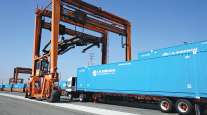Staff Reporter
J.B. Hunt Reports Jump in Revenue for Q1

[Stay on top of transportation news: Get TTNews in your inbox.]
J.B. Hunt Transport Services Inc. experienced a 33% increase in first-quarter revenue, the company reported April 18.
The Lowell, Ark.-based transportation and logistics company posted net earnings of $243.3 million, or $2.29 a diluted share, for the three months ending March 31. That compared with $146.6 million, $1.37, during the same time the previous year.
Total revenue increased by 33% to $3.49 billion from $2.62 billion.
“While overall labor and other supply chain issues have continued, we leveraged experience, focus and technology to move through this period with success,” J.B. Hunt CEO John Roberts said during a call with investors. “Execution across all disciplines within the organization is running at solid performance levels, yet we have clear opportunities for improvement.”
Roberts pointed to equipment utilization as an opportunity for improvement. Nevertheless, the results surpassed expectations by investment analysts on Wall Street, who had been looking for $1.91 per share and quarterly revenue of $3.26 billion, according to Zacks Consensus Estimate.
J.B. Hunt reported that revenue for its truckload segment grew 77% to $264.3 million from $149.5 million during the same time last year. This was primarily due to increased load volume and higher revenue per load. Volume for the segment was up 17% year-over-year as total trailer count increased by 3,000. Revenue per load was up 47% on a 10% increase in haul length.
Operating income for the truckload segment increased 210% to $31.5 million from $10.2 million. Benefits from higher volume and revenue quality led to an improvement in contribution margins across the segment, which were partially offset by higher purchased transportation expense, maintenance costs and technology investments.
The Integrated Capacity Solutions segment reported that revenue increased 29% to $675.4 million from $524.9 million. This was due to overall segment volumes increasing 12% versus the prior-year period. Revenue per load increased 14%. ICS operating income grew 243% to $25 million from $7.3 million. Benefits from higher revenue and gross margin were partially offset by higher wages and investments into platform infrastructure and development.

Transport Topics' Seth Clevenger and Marissa Gamache take you through the process of determining North America’s largest 3PLs in the expanded Transport Topics Top 100 Logistics Companies list. Tune in above or by going to RoadSigns.TTNews.com.
The intermodal segment saw revenue increase 36% to $1.6 billion from $1.2 billion. Eastern network loads increased 10% while transcontinental loads increased 5% for the quarter. But volumes early in the quarter were negatively impacted by network fluidity issues attributable to labor challenges and coronavirus pandemic disruptions.
Intermodal operating income increased 87% to $200.9 million from $107.5 million. This was driven by higher customer rate and cost recovery efforts and approximately $14 million of increased gains on equipment sales. This was partially offset by higher rail and third-party dray purchased transportation costs, wage increases, recruiting costs and network inefficiencies.
The J.B. Hunt 360 marketplace helped drive growth in the three segments. Total freight transactions in the marketplace increased 36% to $600 million from $443 million in the prior-year quarter. ICS revenue on the platform increased 20% to $430 million. Truck segment revenue increased 125% to $116 million. Intermodal revenue increased 68% to $54 million.
The Final Mile Services segment reported that revenue increased 8% to $218.5 million from $201.9 million. This was driven by new customer contracts over the last year and the acquisition of Zenith Freight Lines. This was partially offset by supply chain-related constraints and internal efforts to improve revenue quality across certain accounts.
The FMS segment also experienced an operating loss of $180,000 compared with a gain of $8.5 million last year. The higher revenue was more than offset by increases in wages, new business implementation costs, contracted carrier expenses, recruiting costs and acquisition fees.
The Dedicated Contract Services (DCS) segment reported revenue increased 28% to $741.3 million from $580 million. Revenue per truck per week increased 6% versus the prior period. This was somewhat offset by lower equipment productivity on startup accounts, pandemic-related labor disruptions and more open trucks.
DCS operating income increased 4% to $77.1 million from $74.3 million. Benefits from higher revenue and contracted indexed-based price escalators were mostly offset by increases in wages, benefits, recruiting costs, labor headwinds and the new contractual business.
Cowen and Co. called the report a good kickoff to earnings season. The investment bank and financial services company was particularly encouraged by both the intermodal and trucking segments, highlighting a new partnership between the carrier and BNSF Railway Co.
“JBHT kicked off [first-quarter] transportation earnings with a top and bottom line beat, as strong demand in both intermodal and trucking came in above expectations,” Cowen analyst Jason Seidl wrote in a report. “Volume growth on the intermodal side remains encouraging despite lack of rail fluidity and uncertain economic outlook.”
J.B. Hunt Transport Services Inc. ranks No. 4 on the Transport Topics Top 100 list of the largest for-hire carriers in North America. It also ranks No. 5 on the TT list of the 100 largest logistics companies in North America.
Want more news? Listen to today's daily briefing below or go here for more info:




